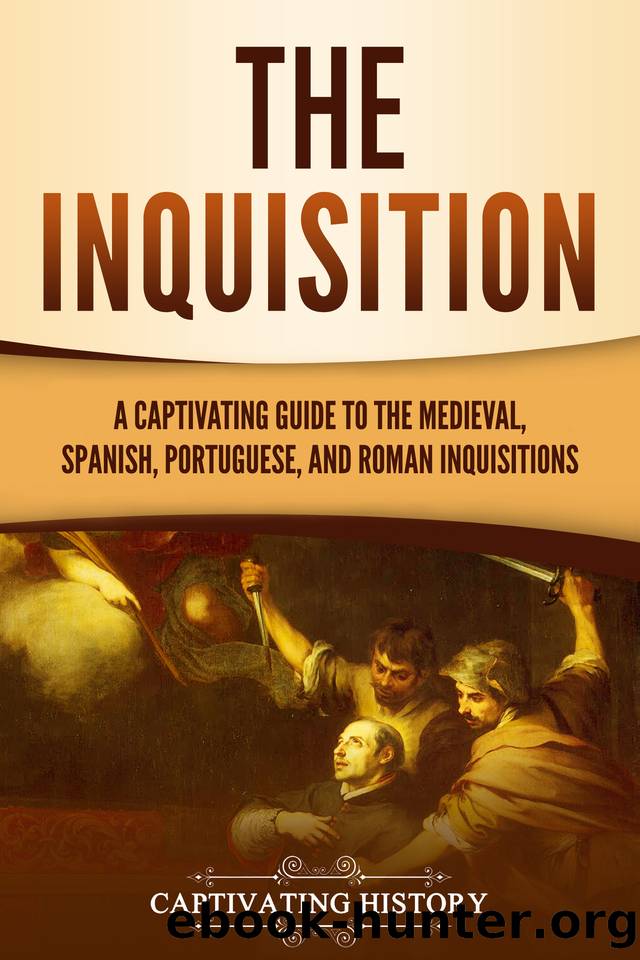The Inquisition: A Captivating Guide to the Medieval, Spanish, Portuguese, and Roman Inquisitions (The Medieval Period) by History Captivating

Author:History, Captivating
Language: eng
Format: epub
Published: 2023-03-09T00:00:00+00:00
Chapter 6: Crime and Punishment during the Inquisition
âIt is in the name of Jesus, himself become God, that fanaticism ignominiously condemned to the stake men like Giodano Bruno, Vanini, Etienne Dolet, John Huss, Savanarola, and numerous other heroic victims; that the Inquisition ordered Galileo to belie his conscience; that thousands and thousands of unfortunates accused of witchcraft were burnt alive in popular ceremonies; it was the express benediction of Pope Gregory XIII that the butchery of St. Bartholomew drenched Paris in blood.â
-Camille Flammarion
The subject of crime and punishment is, of course, always of great importance when talking about any society. All societies have rules, and there has to be some sort of consequence for those who break them. Thus, rules and consequences were of great importance during the time of the Inquisition as well.
Of course, during the Inquisition, what could be considered a crime often depended on who was doing the interpreting. Many things that might not be considered a crime today were considered terrible crimes back in the days of the Inquisition. Some of the crimes inquisitors focused on were rather common, such as theft, forgery, smuggling, and even pure and simple disrespect of authority figures. Most of these are crimes today. But other crimes, such as witchcraft, are not considered crimes today, at least for the most part. However, this was not the case during the Inquisition.
There was also something referred to as ecclesiastical laws. This was a set of laws that had to do with the religious code of conduct rather than the stateâs legal code.
One of the most interesting aspects of the Inquisition that is often missed or overlooked is that a large part of it consisted of those who openly confessed to just about any perceived infraction. As the Inquisition continued its course, it naturally created a climate of paranoia and fear. It was well known that those who confessed to transgressions were more likely to get off easy than those who stubbornly insisted they did nothing wrong. After all, torture was reserved for those who insisted they had committed no transgression.
In many ways, considering the climate of the time, when an inquisitor came to a local community, it often provided an opportunity to clear the air. There were many instances in which townspeople would approach an inquisitor and begin openly confessing to some milder transgressions. For instance, in Spain, a man by the name of Gonzalez Ruiz had been heard boisterously declaring during a game of cards that even if God was on his opponentâs side, he still would not be able to beat him.
The account does not specify whether the man won his card game or not, but it does recall him groveling at the feet of an inquisitor while declaring himself guilty of uttering such a sacrilegious statement. This man likely would not have mentioned anything if it were not for the fact that he feared someone else would tattle on him. Instead, with great relief, he openly confessed to his supposed transgression.
Download
This site does not store any files on its server. We only index and link to content provided by other sites. Please contact the content providers to delete copyright contents if any and email us, we'll remove relevant links or contents immediately.
Room 212 by Kate Stewart(4113)
The Crown by Robert Lacey(4113)
Endurance: Shackleton's Incredible Voyage by Alfred Lansing(3854)
The Iron Duke by The Iron Duke(3650)
The Rape of Nanking by Iris Chang(3526)
Killing England by Bill O'Reilly(3460)
Joan of Arc by Mary Gordon(3268)
Say Nothing by Patrick Radden Keefe(3069)
I'll Give You the Sun by Jandy Nelson(2845)
Hitler's Monsters by Eric Kurlander(2737)
Shadow of Night by Deborah Harkness(2726)
Margaret Thatcher: The Autobiography by Thatcher Margaret(2688)
Mary, Queen of Scots, and the Murder of Lord Darnley by Alison Weir(2680)
Darkest Hour by Anthony McCarten(2650)
Blood and Sand by Alex Von Tunzelmann(2611)
Red Famine: Stalin's War on Ukraine by Anne Applebaum(2469)
Eleanor & Park by Rainbow Rowell(2398)
The One Memory of Flora Banks by Emily Barr(2350)
Book of Life by Deborah Harkness(2270)
